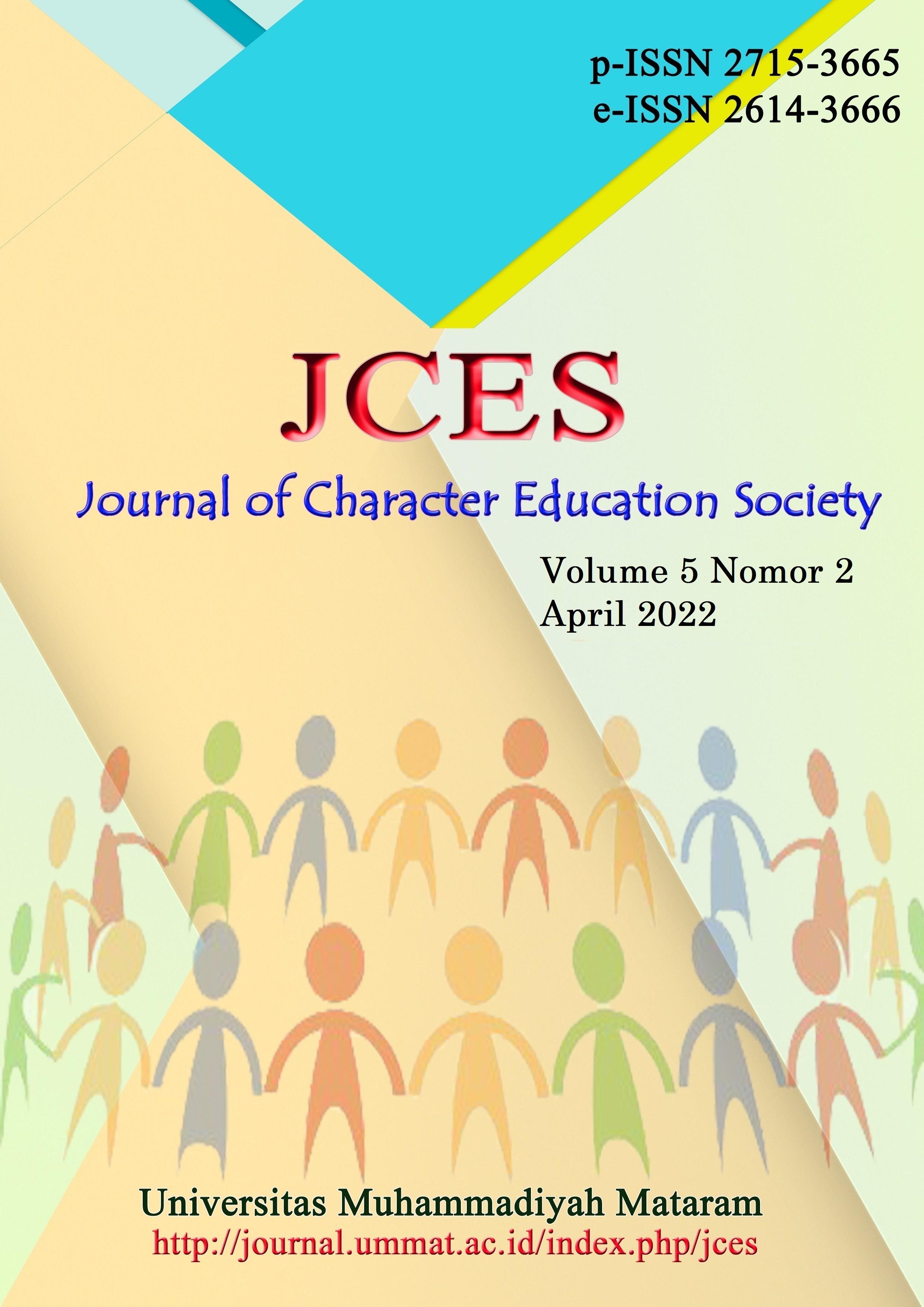PENINGKATAN KESEJAHTERAAN IBU HAMIL PADA MASA PADEMI COVID-19 DENGAN PENERAPAN EKIE (KOMUNIKASI, INFORMASI DAN EDUKASI ELEKTRONIK)
DOI:
https://doi.org/10.31764/jces.v5i2.8043Keywords:
Kelas Ibu Hamil, eKIE, Covid-19.Abstract
Abstrak: Pemerintah merekomendasikan penundaan pemeriksaan ibu gamil selama masa pandemi ke tenaga kesehatan apabila tidak ada tanda-tanda bahaya pada kehamilan. Namun ibu hamil tetap perlu mendapatkan pendidikan kesehatan agar paham mengetahui kondisi kehamilannya. Tujuan dari pengabdian masyarakat ini untuk meningkatkan kesejahteraan ibu hamil di masa pandemi Coronavirus dengan menerapkan eKIE. Sasaran dari kegiatan pengabdian masyarakat ini adalah ibu hamil di Provinsi Kalimantan Timur dan Utara. Metode yang digunakan dalam kegiatan ini yaitu pendidikan kesehatan eKIE (komunikasi, informasi dan edukasi elektronik) berupa pemberian materi dan diskusi interaktif melalui telegram group. Pengabdian masyarakat ini dilaksanakan selama 1 bulan pada bulan November 2021. Tempat kegiatan pengabdian ini adalah melalui media elektronik secara online dengan telegram group. Hasil kegiatan didapatkan bahwa terjadi peningkatan pengetahuan dimana setelah diadakan eKIE terjadi pengetahuan dari 13,9% menjadi 65,4% ; penerapan eKIE untuk meningkatkan pengetahuan dan perilaku ibu hamil dalam menjaga dan meningkatkan kesejahteraanya pada masa pandemi Coronavirus-19.
Abstract:Â The government recommends postponing the examination of pregnant women during the pandemic to health workers if there are no danger signs in pregnancy. However, pregnant women still need to receive health education in order to understand the condition of their pregnancy. The purpose of this community service is to improve the welfare of pregnant women during the Coronavirus pandemic by implementing eKIE. The target of this community service activity is pregnant women in East and North Kalimantan Provinces. The method used in this activity is eKIE health education (communication, information and electronic education) in the form of providing material and interactive discussions through telegram groups. This community service is carried out for 1 month in November 2021. The place for this service activity is through electronic media online with the telegram group. The results of the activity showed that there was an increase in knowledge where after the eKIE was held there was knowledge from 13.9% to 65.4%; application of eKIE to increase knowledge and behavior of pregnant women in maintaining and improving their welfare during the Coronavirus pandemic - 19
References
Ariyanti, R., & Jalilah, N. H. (2021). Kelas Ibu Hamil Pada Masa Pandemi COVID-19. Jurnal Pengabdian Masyarakat Borneo, 5(01), 51–56.
Fuada, N., & Setyawati, B. (2016). Pelaksanaan Kelas Ibu Hamil Di Indonesia. Jurnal Kesehatan Reproduksi, 6(2), 67–75. https://doi.org/10.22435/kespro.v6i2.5411.67-75
Hafandi, Z., & Ariyanti, R. (2020). Hubungan Pengetahuan tentang Covid-19 dengan Kepatuhan Physical Distancing di Tarakan. Jurnal Kebidanan Mutiara Mahakam, 8(2), 102–111. https://doi.org/10.36998/jkmm.v8i2.102
Kemenkes RI. (2019). Profil Kesehatan Indonesia 2018. Kementrian Kesehatan Republik Indonesia.
Kemenkes RI. (2020a). Pedoman Bagi Ibu Hamil, Ibu Nifas, dan Bayi Baru Lahir selama Social Distancing. Kementrian Kesehatan Republik Indonesia.
Kemenkes RI. (2020b). Pedoman Pencegahan dan Pengendalian Coronavirus Disease (COVID-19) (pp. 0–115). Kementrian Kesehatan Republik Indonesia.
Kementrian Kesehatan RI. (2020). pedoman pelayanan Antenatal terpadu edisi ketiga.
Kimani, R., Maina, R., Shumba, C., & S, S. (2020). Maternal and newborn care during the COVID-19 pandemic in Kenya: recontextualising the community midwifery model. Human Resources for Health, 18(75).
Mangnosa, A. B., Kailola, N. E., & Tahitu, R. (2022). Hubungan Tingkat Pengetahuan Dan Sikap Ibu Hubungan Tingkat Pengetahuan dan Sikap Ibu Hamil dengan Kepatuhan Kunjungan Antenatal Care Di Puskesmas Rijali Tahun 2021. Jurnal Epidemiologi Kesehatan Komunitas, 7(1), 458–464.
Nuryawati, L. S., & Budiasih, S. (2017). Hubungan kelas ibu hamil dengan pengetahuan ibu hamil tentang tanda-tanda bahaya kehamilan di Desa Surawangi wilayah kerja UPTD Puskesmas Jatiwangi Kabupaten Majalengka tahun 2016. Jurnal Bidan “Midwife Journal,†3(01), 60–66.
Prem, K., Liu, Y., Russell, T. W., Kucharski, A. J., Eggo, R. M., Davies, N., Jit, M., Klepac, P., Flasche, S., Clifford, S., Pearson, C. A. B., Munday, J. D., Abbott, S., Gibbs, H., Rosello, A., Quilty, B. J., Jombart, T., Sun, F., Diamond, C., … Hellewell, J. (2020). The effect of control strategies to reduce social mixing on outcomes of the COVID-19 epidemic in Wuhan, China: a modelling study. The Lancet Public Health, 2667(20), 1–10. https://doi.org/10.1016/s2468-2667(20)30073-6
Putri, N. R., Amalia, R., & Kusmawati, I. I. (2022). Kelas Ibu Hamil Terhadap Kesehatan Psikologis Ibu Hamil dan Persiapan Persalinan: Systematic Review Pregnant Women Class on Psychological Health of Pregnant Women and Childbirth Preparation: Systematic Review. Indonesian Journal Of Midwifert, 5(1), 29–38.
Retnowati, Y., Yulianti, I., & Ariyanti, R. (2019). Pengantar Asuhan Kehamilan. CV. Bromomurup.
Siti, Cholifah, Paramitha, A. K., Maryati, L. I., & Syeny, S. (2021). Pendampingan Kelas Ibu Hamil Dimasa Pandemi Covid. Jurnal Abadimas Adi Buana, 5(01), 12–19. https://doi.org/10.36456/abadimas.v5.i01.a3351
Zhao X, Jiang Y, Zhao Y, Xi H, Liu C, Qu F, F. X. (2020). Analysis of the susceptibility to COVID-19 in pregnancy and recommendations on potential drug screening. European Journal of Clinical Microbiology & Infectious Diseases.
Downloads
Published
Issue
Section
License
Authors who publish articles in JCES (Journal of Character Education Society) agree to the following terms:
- Authors retain copyright of the article and grant the journal right of first publication with the work simultaneously licensed under a CC-BY-SA or The Creative Commons Attribution–ShareAlike License.
- Authors are able to enter into separate, additional contractual arrangements for the non-exclusive distribution of the journal's published version of the work (e.g., post it to an institutional repository or publish it in a book), with an acknowledgment of its initial publication in this journal.
- Authors are permitted and encouraged to post their work online (e.g., in institutional repositories or on their website) prior to and during the submission process, as it can lead to productive exchanges, as well as earlier and greater citation of published work (See The Effect of Open Access).

